I have an architecture where I would like to query a ksqlDB Table from a Kafka stream A (created by ksqlDB). On startup, Service A will load in all the data from this table into a hashmap, and then afterward it will start consuming from Kafka Stream A and act off any events to update this hashmap. I want to avoid any race condition in which I would miss any events that were propagated to Kafka Stream A in the time between I queried the table, and when I started consuming off Kafka Stream A. Is there a way that I can retrieve the latest offset that my query to the table is populated by so that I can use that offset to start consuming from Kafka Stream A?
Another thing to mention is that we have hundreds of instances of our app going up and down so reading directly off the Kafka stream is not an option. Reading an entire stream worth of data every time our apps come up is not a scalable solution. Reading in the event streams data into a hashmap on the service is a hard requirement. This is why the ksqlDB table seems like a good option since we can get the latest state of data in the format needed and then just update based off of events from the stream. Kafka Stream A is essentially a CDC stream off of a MySQL table that has been enriched with other data.
